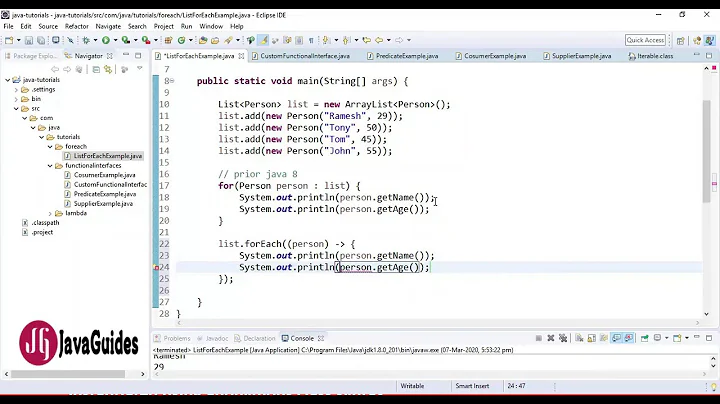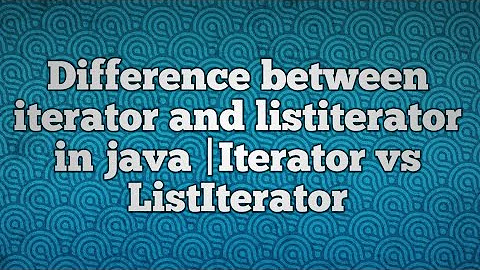what's the point of having both Iterator.forEachRemaining() and Iterable.forEach()?
Solution 1
To understand why the two methods both exist, you need to first understand what are Iterator and Iterable.
An Iterator basically is something that has a "next element" and usually, an end.
An Iterable is something that contains elements in a finite or infinite sequence and hence, can be iterated over by keep getting the next element. In other words, Iterables can be iterated over by Iterators.
Now that you understand this, I can talk about what's the difference between the two methods in question.
Let's use an array list as an example. This is what is inside the array list:
[1, 3, 6, 8, 0]
Now if I call Iterable.forEach() and pass in System.out::print(), 13680 will be printed. This is because Iterable.forEach iterates through the whole sequence of elements.
On the other hand, if I get the Iterator of the array list and called next twice, before calling forEachRemaining with System.out::print(), 680 will be printed. The Iterator has already iterated through the first two elements, so the "remaining" ones are 6, 8 and 0.
Solution 2
In Simple word, forEachRemaining() is an improved version of Iterator, where before JDK8 we were uses hasNext(), next() to traverse the any collection(ArrayList, HastSet etc).
Before JDK8
List<String> fruits= new ArrayList<>();
fruits.add("Apple");
fruits.add("Banana");
fruits.add("Grapes");
fruits.add("Orange");
Iterator<String> iterator = fruits.iterator();
while (iterator.hasNext()) {
System.out.println(iterator.next());
}
Now In JDK8 if we want to we want to traverse any collection we can do like this:
After JDK8:
List<String> fruits=new ArrayList<>();
fruits.add("Apple");
fruits.add("Banana");
fruits.add("Grapes");
fruits.add("Orange");
Iterator<String> iterator = fruits.iterator();
iterator.forEachRemaining((fruit) -> System.out.println(fruit));
Now, JDK8 forEach() is improved version JDK7 with lamda expression.
Related videos on Youtube
Comments
-
 mostafa.S almost 2 years
mostafa.S almost 2 yearsand both of them get a Consumer as parameter. so if Java 8, is meant to avoid confusions, like it has done in Time API, why has it added a new confusion? or am I missing some point?
-
Naman about 7 years
-
 mostafa.S about 7 years@JBNizet all right guys, don't throw tomatoes on me! I got it :D
mostafa.S about 7 years@JBNizet all right guys, don't throw tomatoes on me! I got it :D
-
-
 mostafa.S about 7 yearsall right. thanks for your clear and complete answer.
mostafa.S about 7 yearsall right. thanks for your clear and complete answer. -
Malachiasz over 3 yearsOk, but where is the difference between forEach() and forEachRemaining() ? pl.kotl.in/ehW6pBa5t
-
 Sweeper over 3 years@Malachiasz What part of my answer did you not understand?
Sweeper over 3 years@Malachiasz What part of my answer did you not understand?forEachiterates through the elements of anIterable.forEachRemainingiterates through the remaining elements of anIterator. -
Malachiasz over 3 yearsIn my linked sample forEach iterates also through the remaining elements. Or does forEach() in Kotlin I used is not the same as Iterable.forEach() in Java?
-
 Sweeper over 3 years@Malachiasz Ah... I didn't understand what you meant by the link. Well, this answer is about Java's
Sweeper over 3 years@Malachiasz Ah... I didn't understand what you meant by the link. Well, this answer is about Java'sIterable.forEachvsIterator.forEachRemaining. I am not an expert in Kotlin. It appears that in Kotlin,Iteratoralso has aforEachmethod that works exactly likeforEachRemaining. I suggest you ask a new question if you want more accurate info on that.








